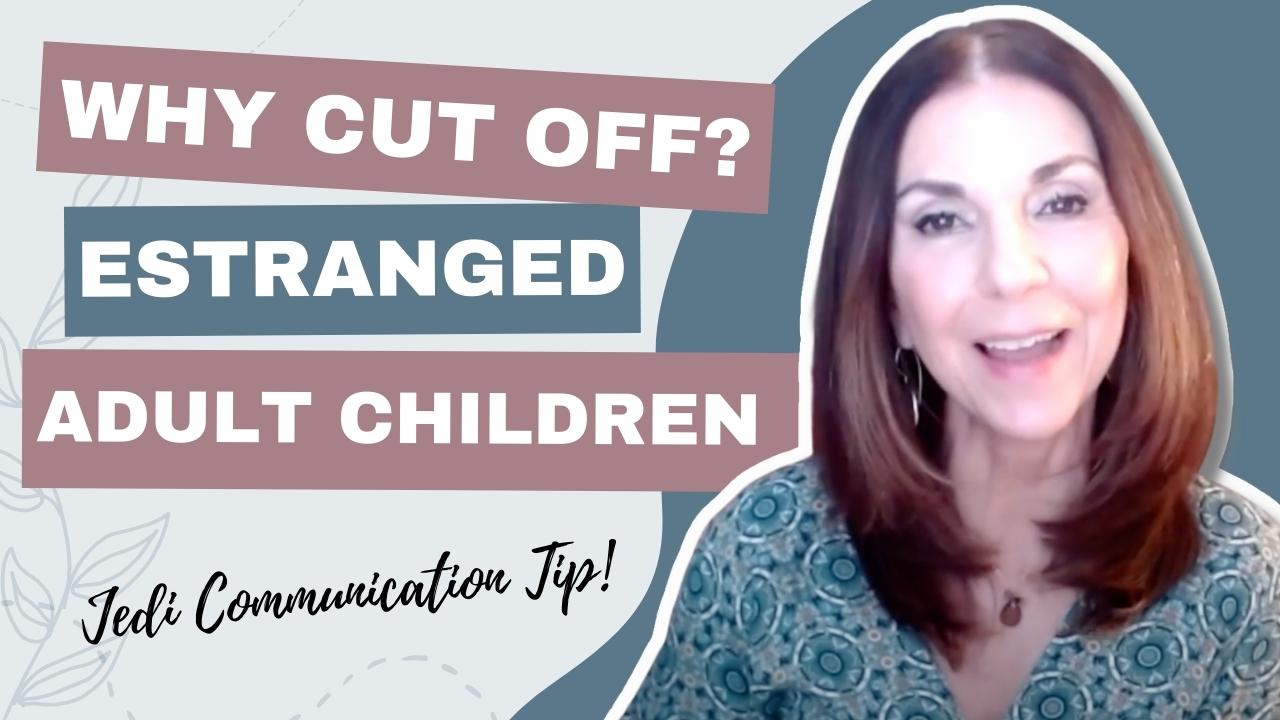Understanding why your estranged adult children cut off is the 6th article in my series on estrangement: the physical and emotional distancing when one family member detaches from another. The experience of being cut off from their adult child can be more devastating than the loss of a child by death.
The ambiguous and uncertain nature of your adult child resorting to ignoring texts and calls, avoiding contact, and not speaking to you can be disturbing.
While a seemingly less than monumental event may precipitate your adult child’s “final straw,” the disintegration of connection deserves investigating.
What brought you and your child to this point? Why have they decided to distance and detach? This article discusses six common reasons why estranged adult children cut off communication. In addition, essential communication skills will assist you in better listening to your adult child.
Parents of estranged adult children often question, “how did this happen?”
There are many variations of estrangement stories and reasons why.
Estrangement is rarely a straight line but rather a jagged history of complicated factors. To make matters worse, parents often suffer from guilt and shame over what they did wrong. Indeed, all parents make mistakes when raising their children. You may not have done anything to incite such a harsh response from your adult child. Like most parents, you did the best you could, and sometimes stuff happens.
Dr. Joshua Coleman’s book “Rules of Estrangement, Why Adult Children Cut Ties and How to Heal the Conflict” examines components that contribute to this condition.
Six Reasons Why Adult Children Cut Off
1. Divorce
Divorce can increase the likelihood of later estrangement. When families split, children may see themselves no longer a part of a unit but rather see each member as an individual with strengths and weaknesses. Children and adults witnessing a divorce can take sides and prefer one parent over another. One Parent may paint the other parent negatively, thereby creating parental alienation. The child or adult child may be overly concerned over one parent’s welfare, which causes them to favor one parent or detach from another. Indeed, after a divorce, there can be remarriage and the addition of unwelcomed others into the family, such as stepchildren, stepparents, boyfriends, and girlfriends. Remarriage and dating can further erode the attention parents give their children.
2. Difficult Daughter In Law or Son in Law
Your adult child’s partner may be emotionally distressed and threatened by your relationship with your child. They may pressure your child to detach and instigate trouble in the relationship. There may be ultimatums and stress in your adult child’s marriage that thwarts your connection.
3. The Presence of Mental Illness or Addiction
Mental illness and addiction on their own are extremely challenging for all. Typically, communication in relationships is affected by their confused and dysregulated state. More than likely, your relationship is further flooded with tension and conflict. Your adult child may be easily agitated. It may be too difficult or impossible for them to interact with you reasonably. In addition, mental illness and addictions can participate in your adult child’s likelihood of misunderstanding or misinterpreting your communication.
4. Their Therapist
Adult children find therapy helpful in sorting out their challenges. It is common for estrangement to occur in the therapeutic relationship. The adult child may report their perspective of events and temperament that may paint the parent very dark. They may exaggerate or focus on being “victims” to some past behavior that hurt them. The therapist may place too much responsibility on the parent or parents. They may be encouraged to cut off from one or both parents to cope with their emotional turmoil. The therapist is getting their side, and that person may be the safe place they have found to express their angst about their parent(s) openly. Therapists can inadvertently guide the adult child to cut off to individuate and evolve without your influence or involvement.
5. Feeling Too Close to the parent
Closely entwined parenting with the child can thwart individuation. The child must discover who he is during development outside of his parent’s influence. The adult child may perceive the parent as holding too much importance and therefore cut off to find themselves as a separate being. They may feel their parent has controlled them, and the only way to gain control of their lives is to detach. Dr. Coleman explains that the adult child believes their parent’s place of importance must change to individuate. They estrange to lessen their significance.
6. Differing Values, Choices, and Lifestyles
Usually, there are strong disagreements about what is right and wrong. There may be a lack of respect towards the adult child’s different choices and path or vice versa. It can occur over partner choices, political preferences, sexuality, and gender. There are likely insurmountable differences and tensions. Personality differences can also complicate communication and contact where all parties are stressed. Detaching becomes a solution to uncomfortable feelings and circumstances.
On the Road to Reconciliation
Your unique estrangement journey may involve levels of grief such as anger, denial, bargaining, depression, and acceptance. Perhaps you are determined to inform yourself so you can prepare to one day reconcile and reunite. Understanding why your adult child has chosen to distance from you will empower you in your journey. Likewise, becoming empathetic to their distinct perspectives when you are ready will give you a more comprehensive view of how you got to this point. Your adult child may have communicated some concerns that hurt you and confused you. Maybe your response was defensive, or you returned fire with fire, tried guilting them, with little results.
You may be too emotionally charged, hurt, and heartbroken to do much of anything. Maybe you have given up. Wherever you find yourself, do your best to take special care of yourself. Spend time with those that are happy to be near you. Do self-care, meditate, exercise, learn breathing exercises, journal, and find gratitude whenever possible. Life is short, and your well-being benefits by allowing yourself to feel and heal.
Be a Jedi Communicator
Learning communication skills to prepare you for contact with your child is crucial. It is a good idea for all parents to listen and validate their adult children whether they agree with them or not. Your adult child will know that you genuinely hear their side of the story when you are proficient at validating them. Indeed, this is an arduous task, especially if they are mean and accusatory. If your adult child can speak to you without being cruel, your conversation will benefit by listening more and validating what they tell you. More advanced boundary skills are necessary when your child is abusive and manipulative.
Your adult child has an unfair advantage. At some point, they may want to hear your version. But while you are beginning your attempt to reconcile, accept that you keep your feelings to yourself. Tell your side to a safe, non-judgmental professional, therapist, or coach, and leave it there. In the meantime, learn to be a Jedi communicator.
A Jedi is a fictitious Star Wars character trained through trials. We borrow this idea to express mastering communication, to hopefully one day reunite.
Your exceptional communication will allow your adult child to see you modeling. When we validate, the other party feels they are understood. Mastering communication makes you more likely to be more attractive. Parents inadvertently repel their adult children by framing conversations with unmet expectations, guilt, defensiveness, and anger. Validation is helpful in all communication.
Validating
Validation begins with listening and not defending your point.
Your goal is for your adult child to know you have heard them, and you get what they are saying.
While your adult child is speaking, you can use visual cues such as nodding or
or saying, “I hear you” or “I can see how you might feel this way.”
Use neutral facial expressions. If you feel emotionally charged, act as though you don’t.
Use body language to convey that what they are saying is essential on its merit.
You can repeat what they have shared with you and respectfully speak that you understood.
If this process is too upsetting for you, find support with a therapist who will listen to you and help you settle somewhat before you attempt talking to your child.
Estrangement is intensely demanding, ambiguous, and uncertain. You don’t know when your adult child will come around, and unfortunately, there is no way of knowing.
Begin to see your journey as challenging but not impossible. Control your end of the relationship by preparing yourself, doing self-care, gaining support, and limiting the effects of chronic stress.
Being estranged from an adult child is heartbreaking. No one imagines they will find themselves separated from their loved ones. Practicing self-care, finding gratitude, gathering with those that love you, gaining support, and being is as vital as reconciling. Exploring key areas such as why adult children cutoff will give you a keener insight into both yourself and your adult child.
What brought you and your child to this point? Why have they decided to distance themselves from you? This article discusses six common reasons why estranged adult children cutoff. And as you wait for reconciliation, communication skills that will help you better listen to your adult child.
Get The eBook: Feeling Heartbroken and Alone? How to Pick Up the Pieces When You are Estranged.
Resources:
- Agllias, Kylie. Family Estrangement A Matter Of Perspective. New York, Routledge, 2017.
- Coleman, Joshua. Rules of Estrangement. New York, Harmony Books, 2020.
- Morin, Marie. Feeling Heartbroken and Alone? How to Pick Up the Pieces When You are Estranged. eBook. 2022.
- Morin, M.L. [Morin Holistic Therapy]. (2022, January 4 ). What is Family Estrangement? You Are Not Alone.
- Morin, M.L. [Morin Holistic Therapy]. (2021, September 8). Diaphragmatic Breathing: 5 Minute Deep Breathing Exercise for Beginners.
- Morin, Marie. How to Deal with Estranged Family During the Holidays (2021, November 21) Sixty and Me. https://sixtyandme.com/estranged-family-holidays/
- Pillemer, Karl. Fault Lines Fractured Families and How to Mend Them. New York Penguin Random House, 2020.





